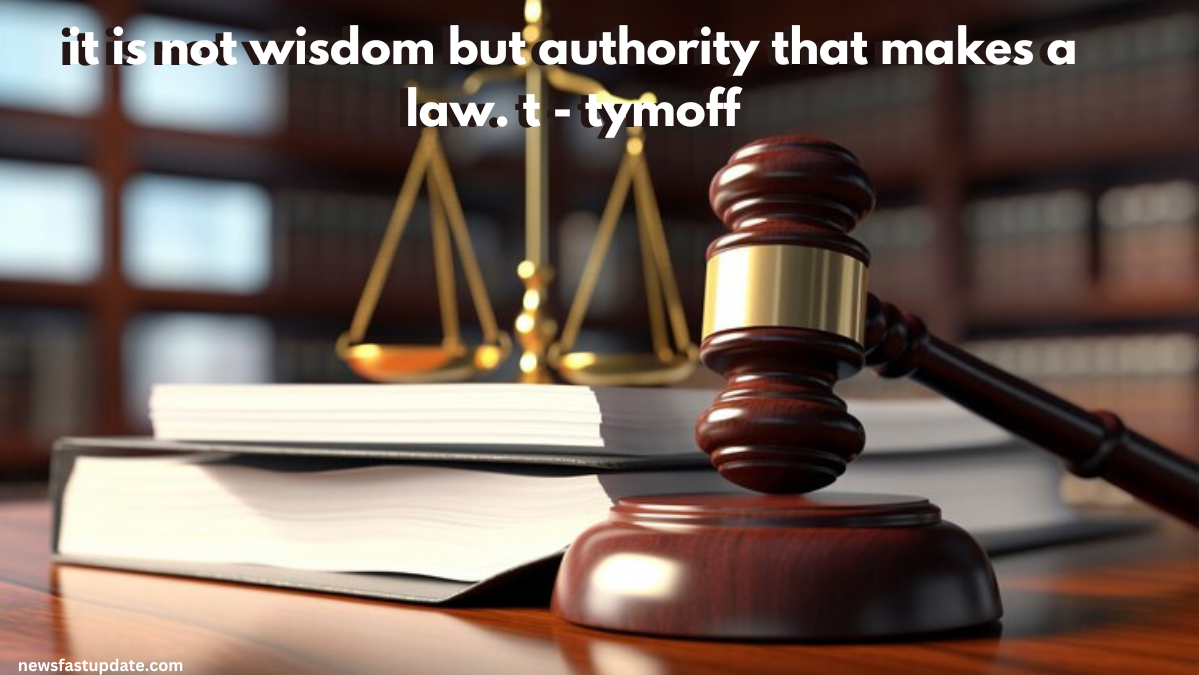Introduction to the it is not wisdom but authority that makes a law. t – tymoff
In the realm of law and governance, a thought-provoking statement by Tymoff resonates deeply: “It is not wisdom but authority that makes a law.” This quote challenges our understanding of what truly constitutes effective legislation. It raises questions about the nature of laws—are they crafted from profound insights and moral reasoning, it is not wisdom but authority that makes a law. t – tymoff or are they simply enforced mandates backed by power? As we delve into this topic, we’ll explore the concept of authority in lawmaking and reflect on how it shapes our society. Join us as we unravel the intricate dance between authority and wisdom in creating just laws that affect our daily lives.
The concept of authority in lawmaking it is not wisdom but authority that makes a law. t – tymoff
Authority in lawmaking is a fundamental aspect of governance. It defines who has the power to create and enforce laws within a society. This concept often stems from established institutions, such as governments or legislatures, which derive their authority from various sources like constitutions or public consent.
When authority dictates the law, it is not wisdom but authority that makes a law. t – tymoff it emphasizes compliance over moral reasoning. Citizens are expected to follow these rules because they are mandated by those in power. The legitimacy of this power can be questioned if it lacks transparency or fairness.
Moreover, authority influences how laws evolve over time. it is not wisdom but authority that makes a law. t – tymoff As societies change, so too must the governing bodies adapt their legal frameworks. However, relying solely on authority risks creating rigid systems that may not reflect the values or needs of the people affected by them. Balancing this with wisdom can lead to more just and effective legislation.
Examples of laws based on authority rather than wisdom
Throughout history, numerous laws have emerged that reflect authority over wisdom. Consider the Prohibition Era in the United States. it is not wisdom but authority that makes a law. t – tymoff Enforced by the government, this law aimed to eliminate alcohol consumption based on moral grounds rather than sound reasoning. The outcome was widespread noncompliance and a surge in organized crime.
Another example is mandatory minimum sentencing laws. These policies often impose strict penalties regardless of individual circumstances or intent. The authority behind these laws overlooks the complexities of human behavior and justice.
In some countries, blasphemy laws are enforced without consideration for freedom of expression or cultural diversity. Such legislation prioritizes power dynamics over rational discourse, stifling dissenting voices.
These examples illustrate how reliance on authority can lead to ineffective or even detrimental legal frameworks that fail to serve society’s best interest.
The impact of authority-based laws on society and individuals
Authority-based laws can significantly shape societal dynamics. it is not wisdom but authority that makes a law. t – tymoff When laws stem from authority rather than wisdom, they often reflect the interests of those in power. This can lead to a disconnect between legislation and the needs of everyday people.
Such laws may foster compliance but often at the cost of public trust. Citizens might feel alienated if laws appear arbitrary or unjust. The result? A society divided by skepticism towards its governing bodies.
Individuals caught in this web may experience frustration or helplessness. They navigate a legal landscape that feels imposed, not crafted for their benefit. Over time, this can breed discontent and prompt civil unrest.
In contrast, when authority is coupled with accountability, there’s potential for positive change. However, without checks on power, authority-based legislation risks it is not wisdom but authority that makes a law. t – tymoff becoming oppressive—drowning out voices that call for equity and fairness in lawmaking processes.
The role of wisdom in creating effective laws it is not wisdom but authority that makes a law. t – tymoff
Wisdom plays a crucial role in the formulation of laws. It encompasses understanding, empathy, and foresight. Wise lawmakers consider not just the legal implications but also the human element involved.
Effective laws should reflect societal values and needs. A wise approach ensures that legislation is relevant and adaptable to change. This adaptability can prevent outdated laws from causing more harm than good.
Moreover, wisdom encourages collaboration among diverse voices. Engaging different perspectives leads to richer discussions and more comprehensive solutions to complex issues.
When lawmakers draw from experience and insight, they are better it is not wisdom but authority that makes a law. t – tymoff equipped to foresee potential consequences. Such foresight helps mitigate negative impacts on individuals and communities.
Wisdom complements authority by fostering an environment where laws serve the greater good rather than merely enforcing power dynamics. It nurtures a sense of justice that resonates with citizens at every level.
Balancing authority and wisdom in lawmaking
Balancing authority and wisdom in lawmaking is a delicate dance. Authority provides the structure necessary for laws to be enforced. Without it, chaos reigns.
However, relying solely on authority can lead to unjust outcomes. Laws crafted without wisdom may overlook the needs of those they are meant to protect.
Wisdom brings empathy and understanding into legislation. it is not wisdom but authority that makes a law. t – tymoff It encourages lawmakers to consider the broader implications of their decisions beyond mere enforcement.
Striking a balance between these elements requires open dialogue among stakeholders. Engaging communities in discussions fosters an environment where diverse perspectives contribute to more equitable laws.
Legislators must recognize that both authority and wisdom play crucial roles in governance. A blend of structured power and thoughtful consideration leads to laws that serve society effectively while promoting justice.
Conclusion: Why both wisdom and authority are necessary for creating just laws
The interplay between wisdom and authority in lawmaking reveals a complex relationship. it is not wisdom but authority that makes a law. t – tymoff Authority provides the structure necessary for laws to exist and be enforced. Yet, without wisdom, those laws can become rigid and disconnected from the values they aim to uphold.
Effective laws should stem from an understanding of human nature, societal needs, and ethical considerations. When lawmakers incorporate wisdom into their decisions, they create legislation that not only commands respect but also resonates with justice.
Thus, it’s essential for those in power to recognize that while authority is crucial for establishing rules, it must be guided by thoughtful consideration of what is right and fair. it is not wisdom but authority that makes a law. t – tymoff A balance between these two elements ensures that our legal systems evolve into frameworks that benefit society as a whole. Striving for this equilibrium fosters trust in governance and nurtures communities where everyone can thrive under just laws.



